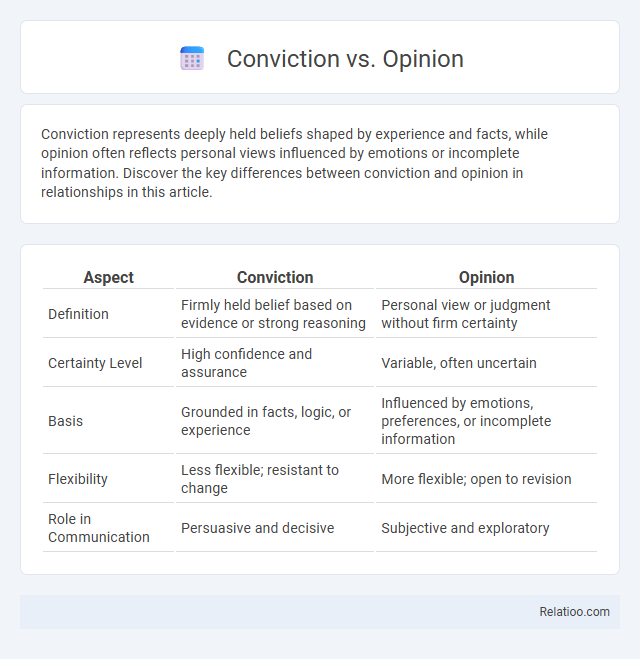Conviction represents deeply held beliefs shaped by experience and facts, while opinion often reflects personal views influenced by emotions or incomplete information. Discover the key differences between conviction and opinion in relationships in this article.
Table of Comparison
| Aspect | Conviction | Opinion |
|---|---|---|
| Definition | Firmly held belief based on evidence or strong reasoning | Personal view or judgment without firm certainty |
| Certainty Level | High confidence and assurance | Variable, often uncertain |
| Basis | Grounded in facts, logic, or experience | Influenced by emotions, preferences, or incomplete information |
| Flexibility | Less flexible; resistant to change | More flexible; open to revision |
| Role in Communication | Persuasive and decisive | Subjective and exploratory |
Understanding Conviction and Opinion
Conviction represents a firmly held belief based on strong evidence or personal experience, while opinion reflects a subjective viewpoint influenced by individual preferences or limited information. Understanding conviction requires recognizing its deep-rooted nature and the confidence it instills, whereas opinion often remains open to change with new insights. Your ability to distinguish between these concepts enhances critical thinking and decision-making skills.
Definitions: What Sets Conviction Apart from Opinion?
Conviction represents a firmly held belief rooted in strong evidence or personal experience, whereas opinion often reflects a subjective viewpoint influenced by individual preferences or incomplete information. Your conviction typically involves a deeper commitment and certainty compared to the more flexible and changeable nature of an opinion. The key distinction lies in conviction's foundation on resolute confidence and perceived truth, setting it apart from opinion's open-ended and debatable character.
Origins of Convictions and Opinions
Convictions originate from deeply held beliefs formed through personal experiences, cultural influences, and core values, providing a strong internal compass for your decisions and actions. Opinions arise from individual interpretations and information exposure, often influenced by social context and knowledge but lack the profound personal commitment found in convictions. Understanding these origins helps distinguish firmly rooted convictions from more flexible, changeable opinions.
Psychological Foundations: Why We Hold Convictions vs. Opinions
Convictions arise from deeply rooted psychological needs for identity and certainty, often linked to emotional investment and core values, whereas opinions tend to be more flexible and based on surface-level information or preferences. Psychological foundations highlight that convictions engage the brain's reward system and are reinforced by cognitive biases like confirmation bias, solidifying these beliefs beyond rational evaluation. Understanding this distinction aids in recognizing why changing a conviction is more challenging than altering an opinion, as convictions are entwined with one's sense of self and emotional resilience.
Impact on Decision-Making: Conviction vs. Opinion
Conviction drives decision-making with firm, unwavering belief often based on deeply held values or evidence, leading to decisive and consistent actions. Opinion, being more flexible and subjective, allows for adaptability and change as new information emerges, which can result in inconsistent or exploratory decisions. The impact of conviction versus opinion in decisions hinges on the balance between the need for certainty and openness to alternative perspectives.
Social Influence: How Convictions and Opinions Shape Groups
Convictions form the deeply held beliefs that drive consistent behaviors and shape group identities, while opinions represent more flexible viewpoints subject to change through social influence. Social influence mechanisms, such as conformity and persuasion, play critical roles in aligning individual opinions with group convictions, reinforcing collective norms and cohesion. Groups with strong shared convictions tend to exhibit greater resistance to dissent and stronger social bonding, impacting decision-making and social dynamics.
Strength and Flexibility: Unyielding Conviction vs. Adaptable Opinion
Unyielding conviction embodies the strongest form of belief, often resistant to change due to deep-rooted values or evidence. Opinions demonstrate greater flexibility, allowing you to adapt based on new information or perspectives without compromising your core principles. Understanding the balance between these mental states enhances decision-making by distinguishing when to hold firm and when to remain open to alternative viewpoints.
Conviction, Opinion, and Critical Thinking
Conviction represents a firmly held belief supported by strong evidence and reasoning, distinguishing it from mere opinion, which is often subjective and lacks substantial proof. Critical thinking plays a crucial role in developing conviction by enabling individuals to analyze information objectively, evaluate arguments, and discern truth from bias. Emphasizing conviction over opinion fosters more rational decision-making and deeper understanding in complex discussions.
Real-World Examples: Conviction and Opinion in Action
Conviction drives individuals to take decisive actions, such as whistleblowers exposing corporate fraud, while opinions often reflect personal preferences, like choosing a favorite brand without deeper commitment. Real-world examples highlight that conviction motivates persistent efforts to uphold values, whereas opinions may shift with new information or social influence. Political activism demonstrates conviction in action, contrasting with public opinion polls that capture transient beliefs.
Navigating Conversations: Respecting Convictions and Opinions
Navigating conversations requires recognizing the key differences between convictions and opinions, as convictions are deeply held beliefs rooted in personal values, while opinions are more flexible perspectives shaped by information and experience. Respecting your conversation partner's convictions fosters trust and meaningful dialogue, even when viewpoints clash, by acknowledging the emotional weight behind their stance. Effective communication thrives on empathy and openness, enabling both parties to share ideas without dismissing deeply held beliefs.

Infographic: Conviction vs Opinion
 relatioo.com
relatioo.com